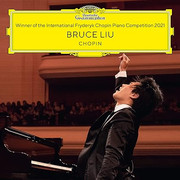Chopin's Nocturnes have been some of the most beloved and popular works in the piano's repertoire. At the moment, they are on the 11th tier of the the Talk Classical community's favorite and most highly recommended works.
Wikipedia's article about them has a little information--just enough to serve as a listening guide. The best source for recording recommendations is probably Trout's blog post on this work:
Anyway, the main questions are: Do you like these works? What do you like about them? Do you have any reservations about them?
And of course, what are your favorite recordings?
Wikipedia's article about them has a little information--just enough to serve as a listening guide. The best source for recording recommendations is probably Trout's blog post on this work:
Here is another TC thread exclusively dedicated to recommending recordings of the Nocturnes.
Anyway, the main questions are: Do you like these works? What do you like about them? Do you have any reservations about them?
And of course, what are your favorite recordings?





